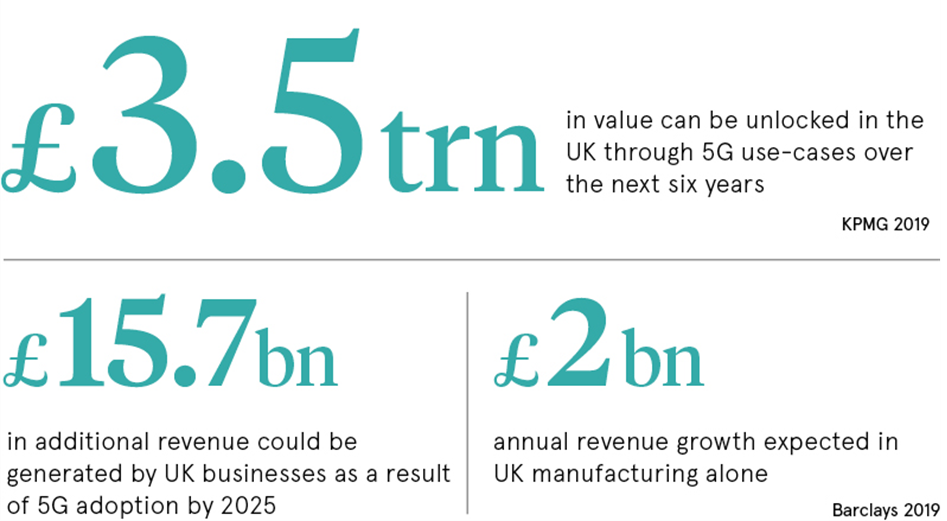We discuss the following topics in this blog:
- Private 5G network as the undisputed answer for peaking demand
- Businesses Realise Their True Potential Using Private 5G Networks
- Various Industry Cases Using Private 5G
In addition to these topics, we shall also be answering the following FAQs:
- What is 5G NR?
- What is WiFi?

Contents
Overview
5G may take a while before it becomes the most adopted technology by businesses in the approaching decade, but the 5G network is definitely going to transform the disconnected world by laying the foundation for real connected experiences. In today’s day and age, more than ever, people need to have effortless access to data whenever and wherever required. This is not true just for personal lives, but with remote working and enterprise workforce all over the place, seamless and uninterrupted 5G connectivity is the need of the hour.
To achieve this level of continuous workflow, many organizations are technologically advancing to machine learning, big data, cloud, internet of things, artificial intelligence, the potential of which can only be realised with 5G technology. The demand for this type of high-quality, omnipresent connectivity is at its peak.
A private 5G network is the undisputed answer for this peaking demand and will act as a game-changer across industries such as healthcare, utilities, logistics, retail, public transport, manufacturing, retail and more. By equipping employees on the go or working from home or on-site with effortless access to the required tools, the 5G network will be truly transformative, operationally and strategically.
Things that were only envisioned or watched in sci-fi movies such as autonomous vehicles, robotic surgeries, drone deliveries and smart factories will be unleashed in reality, thanks to 5G technology. Without data, a company is stalled – these technological advancements will change how data is collated, analysed and used for the future. Right from operational activities, to employee empowerment, to service delivery, revolutionizing customer interaction to data analysis and insights for favourable and sustainable decision making, private 5gwill help realises all this.

Source: Raconteur

Approximately £3.35 trillion is expected to be unlocked via use-cases over the next seven years across healthcare, government, manufacturing, finance, consumer goods, and media/ technology/telecom industries.
What are the Overall Benefits of Private 5G?
First, let us understand how a private 5G network differs from a public 5G. A private 5G network offers organizations enhanced personalization and complete control over their connectivity along with the regular benefits of 5G such as low latency, greater reach and increased bandwidth. This enables business leaders to have a unified networking strategy running across the organization.
Like Wi-Fi, private 5G networks require small, local cellular towers to offer internet access points. This is ideal for large manufacturing units, logistics warehouses and other private institutions like colleges that function through large campuses. They can install their own5G network to provide 5G connectivity locally.
- Private 5G networks offer stringent security as they are not required to be connected to the greater telecom network. This makes private 5G very lucrative for companies that require high security, such as power plants and military manufacturing.
- Private 5G networks are extremely customizable and are built according to the exact specifications required by a company. When one goes for public 5G they can only select from the options offered by the telecom and then manage and analyse the data internally.
- Businesses have only always profited from enhanced connectivity, such as the shift from 4G to 5G. But there are many dimensions to better connectivity, such as increased responsiveness and the ease of adding extra devices and sensors. With a private 5G network, reliability, security, end-to-end control, and customization adds to the improvised dimensions.
- A private 5G network turns out to be more cost-effective, faster to install, easier to set up, offers more reliability and security as organisations don’t require costly cabling and manpower to install it.
- The remote workforce remains connected across multiple sites through a range of software-defined solutions, Internet of Things and enterprise mobility applications which generate huge volumes of data each day. With a private 5G network businesses can safely gather, store, analyse & deliver actionable insights for future sustainable growth. Not only does private 5G offer device accessibility and security but also fuels the power and performance needed for these resource-intensive IoT & big data projects.
IDC analysts project that the global LTE / 5G private infrastructure equipment revenue will increase from $ 945 million to $ 5.7 billion in 2024, over a period of five years.**
How Can Businesses Realise Their True Potential Using Private 5G Networks?
Private 5G network helps businesses leverage the full potential of predictive analysis, Internet of Things, Artificial Intelligence, Machine Learning, Virtual Reality and other software-driven technologies.
Private 5G networks will enable emerging promising technologies to unleash their full potential through the speed and low latency being offered by 5G.
The manufacturing sector for instance will operate via smart factories by empowering everything from omnipresent IoT sensors to mobile robots, disrupting the manufacturing models that are been used since the time of Henry Ford, rendering them redundant. Smart factories would no longer have parts moving on a conveyor belt but have smart robots doing all the work across the manufacturing plant. All this while clusters of IoT endpoints generate overflowing data that enable enhanced and advanced levels of productivity, inventory tracking, safety and sustainability. Such transformations will not be limited to this sector and will be witnessed in retail, healthcare, logistics and other sectors as well.
Private 5G networks will revolutionize your business
Whenever bandwidth and speed rise, innovation reaches new heights. Before 2G was introduced one could not imagine carrying an email device in their pockets. And with the launch of 4G,one saw the emergence of the wireless generation.
Various Industry Cases Using Private 5G
In extremely complex networks such as hospitals or military installations, 4 million things per square mile can be connected. And once the latency is brought down, one can address shortcomings and defects very quickly.
Private 5G Network in Healthcare
Healthcare is probably the fastest growing sector that requires private networks, especially after the increased strain the COVID-19 pandemic has put on the existing medical infrastructure across countries. The unprecedented spread of COVID-19 caused a sudden demand of ICU beds and countries across the globe struggled to cope up through modernizing their facilities and building new infrastructure. This unforeseen increased demand further generated a demand for enhanced connectivity to create new healthcare facilities as well as to maintain the existing ones which led to the hospitals deploying private networks.
By collecting huge amounts of data and using it with Artificial Intelligence, the potential to advance healthcare is immeasurable. Medical trends and irregularities that may otherwise go unobserved could be brought to light and significantly improve patient care.
Private 5G Networks in Smart Facilities –
Private 5G networks facilitate the smartness of facilities through delivery of remarkably better mobile connectivity that drives digital transformation, and makes sense to be deployed at stadiums, airports, and office buildings. Switching to private 5G networks will resul personal lives but t in a cascading effect – from upgraded connectivity to better quality network indoors to fast & secure deployment of advanced IT solutions. Upgrading to a private 5G network will further allow these smart facilities to change over to low latency and bandwidth intensive services such as real time analytics and high-definition video streaming.
Private 5G networks in Logistics –
The logistics industry is yet another area that has great potential to be achieved when they switch to private 5G networks. With the increasing e-commerce penetration, all the logistics checkpoints from the first mile pick up to last mile delivery to reverse pick-ups need to be tracked and analysed. The supply chain elements such as warehouses, ports, distribution centres tend to have an incessant flow of goods that need to be tracked and connected via multiple enterprise mobility devices. Over the years, this sector has been focused on automating multiple logistical functions using remote workforce devices and robots that require high connectivity. Thus, the benefits of 5g for businesses such as logistics are unparalleled & imperative if they are looking at advanced digital transformation.
Private 5G networks in Manufacturing –
Manufacturing plants have a wide variety of wired and wireless infrastructure. Private 5G networks can play a vital role in enhancing the concentration and performance of automation technologies such as robot and self-driven vehicles in the factory. Right now, the potential of the robots is limited due to Wi-Fi and poor connectivity, rendering their movement limited and creating a lag in the real time data transfer. Deployment of a private 5G network will increase agility and production, bring down the response time and store sensitive data internally.
Private 5G networks will set the foundation for businesses to track consumer behaviour, customise their marketing plans, offer better services and deliveries, achieve operational efficiency, empower their employees through seamlessly connected devices and accessibility and eventually lead to predictive analytics and better decision making for a sustained and profitable future.
Private 5G can eliminate so many loopholes and shortcomings that are preventing businesses from achieving their full potential. Low latency, security and high speed are a few of the benefits of 5g for businesses that are out there, but there is so much more that is unknown and unimaginable that can be unleashed with the help of private 5G networks.
FAQs
What is 5G NR?
5G typically refers to the fifth generation of wireless technology. NR, commonly known as New Radio, is a standard developed by the 3GPP Group (Release 15 being the first version introduced back in 2018) outlining the technology required to harness the newly-available millimeter-wave frequencies. The two frequency bands in which 5GNR operates are Frequency Range 1, i.e., Sub 6GHz band (410 MHz to 7125 MHz), and Frequency Range 2, i.e., millimeter-wave (24.25 to 52.6 GHz). Over 4G LTE, 5G NR provides better spectrum utilization, faster data rates, hardware efficiency, and improved signal processing.
From a deployment standpoint, we have Non-Standalone Mode(NSA), Dynamic Spectrum Sharing(DSS), and Standalone Mode (SA). The initial deployments of 5G NR are based on NSA standards, meaning the existing 4G LTE network will operate on the control plane, and 5G NR will be introduced to the user plane. This particular standard was introduced by 3GPP, keeping in mind the industry’s push to faster 5G services rollout while utilizing the existing 4G LTE infrastructure currently in place. On the other hand, operators are also implementing Dynamic Spectrum Sharing (DSS) to accelerate the deployment cycle, reducing costs and improving spectrum utilization. In this standard, the same spectrum is shared between the 5G NR and 4G LTE, multiplexing over time per user demands. Lastly, we have the Standalone Mode (SA), which moves towards a complete 5G based network where both signaling and the information transfer are driven by a 5G cell.
In the future, 5G will enable new services, connect new industries and devices, empower new experiences, and much more, providing mission-critical services, enhanced mobile broadband, and various other things.
a) Enhanced mobile broadband (eMBB) Applications: High device connectivity, High mobile data rates, and Mobile AR & VR applications
b) Ultra-reliable, low-latency communications (uRLLC)Applications: Autonomous vehicles, Drones, Data monitoring, Smart mfg.
c) Massive machine-type communications (mMTC)Applications: Healthcare, Industry 4.0, Logistics, Environmental monitoring, Smart farming, Smart grids
What is WiFi?
Put simply, WiFi is a technology that uses radio waves to create a wireless network through which devices like mobile phones, computers, printers, etc., connect to the internet. A wireless router is needed to establish a WiFi hotspot that people in its vicinity may use to access internet services. You’re sure to have encountered such a WiFi hotspot in houses, offices, restaurants, etc.
To get a little more technical, WiFi works by enabling a Wireless Local Area Network or WLAN that allows devices connected to it to exchange signals with the internet via a router. The frequencies of these signals are either 2.4 GHz or 5 GHz bandwidths. These frequencies are much higher than those transmitted to or by radios, mobile phones, and televisions since WiFi signals need to carry significantly higher amounts of data. The networking standards are variants of 802.11, of which there are several (802.11a, 802.11b, 801.11g, etc.).














